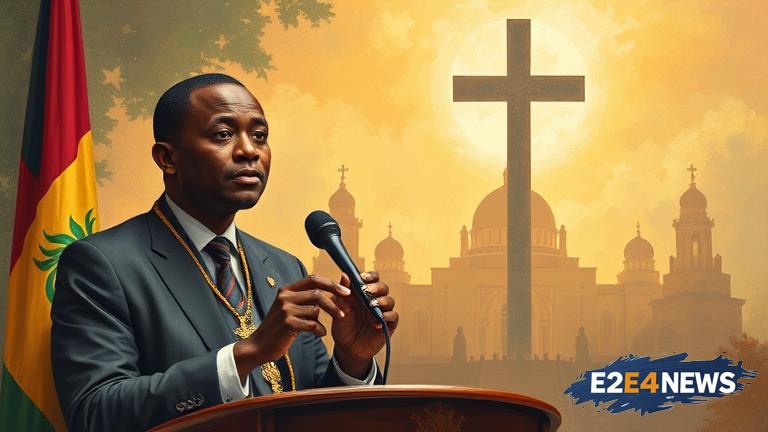An open letter addressed to the Presidential Envoy for Interfaith and Ecumenical Relations in Ghana has raised concerns about the role of prophecies in the country’s development. The letter, which was published on a popular online news platform, criticized the envoy for allegedly prioritizing prophecies over more pressing issues affecting the nation. The author of the letter argued that the envoy’s focus on prophecies was not only unproductive but also divisive, as it created unnecessary tension among different religious groups. The letter also questioned the envoy’s ability to effectively promote interfaith and ecumenical relations, given the perceived bias towards certain religious groups. Furthermore, the author expressed concern about the potential consequences of prioritizing prophecies, including the erosion of trust in the government and the perpetuation of superstition. The letter sparked a heated debate, with some defending the envoy’s approach and others criticizing it as misguided. Proponents of the envoy’s approach argued that prophecies played a crucial role in Ghana’s cultural and religious heritage, and that they could serve as a source of inspiration and guidance for the nation. On the other hand, critics argued that prophecies were often vague and open to interpretation, and that they could be used to manipulate public opinion. The controversy surrounding the open letter has highlighted the complexities of promoting interfaith and ecumenical relations in a country with a diverse religious landscape. Ghana is a country with a significant Christian population, as well as a sizable Muslim population, and a smaller but still significant number of adherents to traditional African religions. The country’s constitution guarantees freedom of religion, and the government has generally been supportive of interfaith dialogue and cooperation. However, the recent controversy has raised questions about the limits of religious freedom and the role of government in promoting interfaith relations. Some have argued that the government should take a more active role in promoting interfaith dialogue and cooperation, while others have argued that the government should avoid taking sides or promoting any particular religion. The debate has also highlighted the importance of critical thinking and skepticism in evaluating prophecies and other claims of supernatural knowledge. In a country where many people place a high value on traditional beliefs and practices, it can be challenging to promote a more nuanced and evidence-based approach to decision-making. Nevertheless, the controversy surrounding the open letter has sparked a necessary conversation about the role of religion in Ghana’s development, and the need for a more inclusive and evidence-based approach to promoting interfaith and ecumenical relations. The Presidential Envoy for Interfaith and Ecumenical Relations has a crucial role to play in promoting dialogue and cooperation among different religious groups, and in ensuring that the government’s policies and programs are inclusive and respectful of all citizens, regardless of their religious beliefs. Ultimately, the success of the envoy’s efforts will depend on the ability to balance competing interests and priorities, and to promote a more nuanced and evidence-based approach to decision-making. The controversy surrounding the open letter has also highlighted the importance of media literacy and critical thinking in evaluating information and claims of supernatural knowledge. In a country where many people rely on social media and other online sources for news and information, it is essential to promote a more critical and nuanced approach to evaluating information. The government and other stakeholders have a crucial role to play in promoting media literacy and critical thinking, and in ensuring that citizens have access to accurate and reliable information. By promoting a more inclusive and evidence-based approach to decision-making, and by supporting critical thinking and media literacy, Ghana can build a more resilient and prosperous future for all its citizens. The country’s development depends on the ability to balance competing interests and priorities, and to promote a more nuanced and evidence-based approach to decision-making. The Presidential Envoy for Interfaith and Ecumenical Relations has a crucial role to play in promoting dialogue and cooperation among different religious groups, and in ensuring that the government’s policies and programs are inclusive and respectful of all citizens, regardless of their religious beliefs. The controversy surrounding the open letter has sparked a necessary conversation about the role of religion in Ghana’s development, and the need for a more inclusive and evidence-based approach to promoting interfaith and ecumenical relations.
